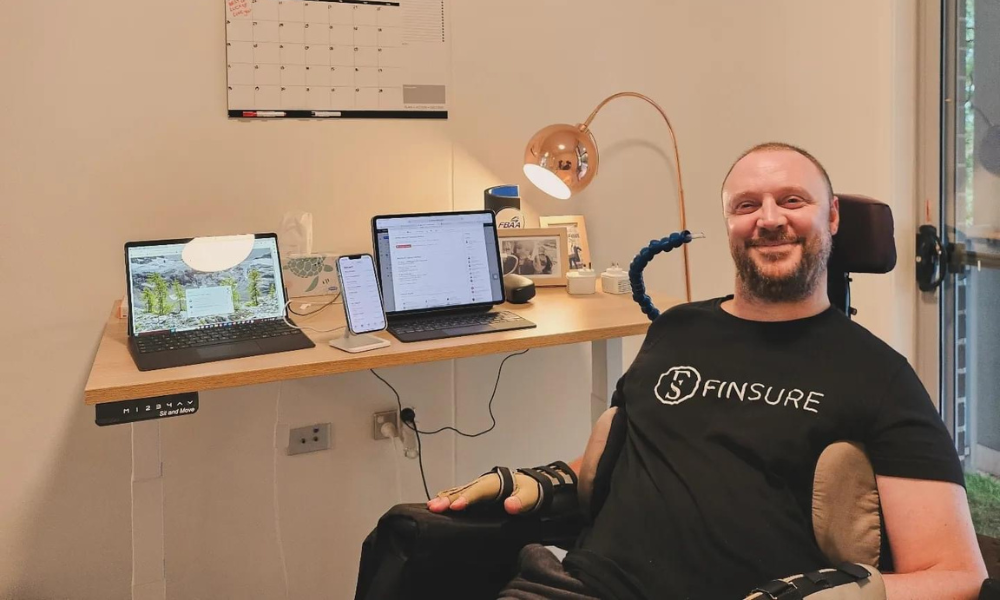
'It was just an automatic rallying of the business and the troops behind Phil' Finsure CEO says

Phillip Donaldson, an executive at Australian mortgage broking aggregator Finsure, has returned to work a year after a tragic car accident which left him paralysed from the neck down and resulted in him losing a leg.
Donaldson is one of Finsure’s longest-serving employees, having joined the business in 2015.
In April 2023, while on holiday in his former homeland of New Zealand, Donaldson was seriously injured during a vehicle rollover. He sustained significant spinal cord injuries but managed to survive.
Following 10 months in hospital and extensive rehabilitation work, Donaldson returned to work as NSW business development manager at Finsure Loans, according to Australian Broker.
“I don’t know if I could have survived without the support of Kathleen, my parents, the Finsure family and my many friends in the broker community,” Donaldson said. “It’s still very challenging as I only have limited use of my body, but it’s great to be back at work and that was something I could not have imagined happening a year ago.
“There’s still a long road ahead with my rehabilitation but being back at work among the Finsure family is a crucially important part of my recovery.”
Finsure CEO Simon Bednar told HRD Australia it was “horrendous” when he first heard about Donaldson’s accident.
“There was still a degree of uncertainty around exactly what the impact of the accident was going to be.”
And while this was not a workplace accident – so there was no obligation for the business to step in – Bednar and the Finsure team offered their support to Donaldson’s then fiancée (now wife) Kathleen and his family.
This included providing financial support for Donaldson’s family to get an Airbnb close to the hospital he was admitted to and, through the people and development department, assisting with his health insurance coverage.
“For Finsure though, that was never in question,” Bednar said. “It was like a brother or cousin or family member who was injured. It was the most amazing thing for me as a CEO, we didn't have to ask or justify to anyone in the business. It was just an automatic rallying of the business and the troops behind Phil, which was really heartfelt.”
Bednar described how Finsure made sure it communicated with its staff about what happened to Phillip.
“We wanted there to be a very consistent and clear message so the employees or the business wasn't actually assuming and weren't hearing about these things secondhand,” he said. “That was really important to get a very clear message out. And we iterated the executive support for Phil.
“But outside of that, the staff themselves rallied behind him. There were probably four or five staff and it was probably a handful of brokers who independently went across and spent time with Phil before he was able to relocate back to Australia.”
Kathleen created a GoFundMe page for financial assistance to help with Donaldson’s ongoing care and recovery, which has raised more than $400,000.
“Much of the money raised for Phillip came directly from the broker community, lenders and even other aggregation groups, which says a lot about the industry we work in,” Donaldson said.
And Bednar added that the Finsure team also provided IT support to shutdown copycat GoFundMe accounts pretending to be Phillip to raise money.
Bednar described how he reassured Donaldson about his ongoing employment at Finsure.
“One thing that Philip was very focused and conscious of was being part of the Finsure family,” Bednar said. “He was concerned that this would impact what that might look like moving forward both from a relationship perspective but also from an employment perspective.
“And it was great just to reassure him that if it took six months or 12 months or three years, his role at Finsure would be secure, so he could then put his energy into getting better. Because what I found in the past – and you have people who have these sort of traumas – is they split their time and their energies into worrying about things that they don't control.”
Finsure ensured it worked with Phillip in the process of him returning to work. They didn’t make any decisions without him and made sure they respected his needs and didn’t any assumptions on his behalf.
“Phil's an amazingly talented individual,” Bednar said. “And I effectively asked him what he wanted to do and he was very keen in getting back on the phones and specifically talking to people.
“So what we did was actually take that and construct a role within the business that allowed him to do that within the capabilities that he had. And so that meant ensuring that he had the right IT infrastructure that had all the relevant voice commands and technology that he could use. And then also giving him a work schedule that allowed him to work in line with the support he's getting from his physio in the hospitals.”
Bednar revealed the advice he would give HR teams when it comes to supporting employees who may sustain a serious injury outside of work.
“Anyone who suffers this sort of traumatic experience, there is a high degree of intent on these individuals to continue to work,” he said. “They want to feel they want to be part of the community and part of the work environment. So providing them with an avenue to do that goes a long way in supporting their mental health.”
He also described employees as usually being the core or pulse of a business and HR teams shouldn’t neglect that.
“At the end of the day for us, I think what helped Phil get through some of the post trauma experience was knowing that he had a family in his back corner really supporting him,” he said. “So that's really important. And that comes from top down in our business.”